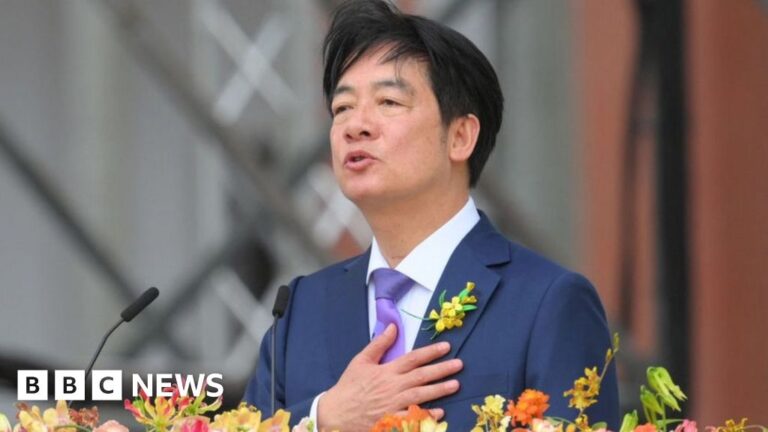- Written by Rupert Wingfield-Hayes
- BBC News, Taipei
image source, Getty Images
William Lai, Taiwan’s new president, called on China to stop threatening Taiwan and accept the existence of democracy.
Immediately after taking office on Monday, he urged China to replace confrontation with dialogue.
He also said Taiwan will not back down in the face of threats from China, which has long claimed it as its own territory.
Mr. Lai is disliked by China and considered a “separatist.”
In recent years, pressure on Taiwan has also increased.
Military incursions by China into the sea and airspace around the island have become commonplace in recent years, raising fears of conflict. In his speech, Mr. Rai called this “the greatest strategic challenge to world peace and stability.”
But the 64-year-old also remains faithful to the formula used by her predecessor, President Tsai Ing-wen, whose legacy will be defined by her measured but steady handling of China.
Lai, a doctor turned politician, won a three-way presidential election in January, securing an unprecedented third term for his Democratic Progressive Party (DPP). He has served as Tsai’s vice president since 2020 and previously served as Tsai’s prime minister. In his youth, he openly advocated for Taiwan’s independence and was known as a more radical politician who could not escape Beijing. Labeling him a “troublemaker” ahead of the polls, Chinese state media even suggested he should be prosecuted for secession.
The Chinese government has not yet issued a statement regarding Lai’s appointment. However, the Chinese embassy in the UK held a press conference over the weekend and urged the British government not to support this. And early last week, a spokesperson for the China Taiwan Affairs Office warned that Taiwan’s new leaders “need to seriously consider” the question of whether they want peaceful development or conflict.
And just as Mr. Lai took his oath, China’s Ministry of Commerce announced sanctions against several U.S. companies “involved in arms sales to Taiwan.”
But on Monday, Mr. Lai offered a much more conciliatory statement. He reiterated that he would do nothing to change the ambiguous diplomatic status quo, which does not recognize Taiwan as a country despite its constitution and sovereign government. China makes this claim, accusing Taiwan’s main allies such as the United States of altering the delicate agreement by supporting Taiwan.
Lai vowed peace and stability and said he hoped to resume exchanges across the Taiwan Strait, including with groups of Chinese tourists visiting Taiwan. But he said islanders should have no illusions about the Chinese threat and that Taiwan needed to further strengthen its defenses.
This was also a continuation of the Tsai administration’s policies. Taiwan’s former president believed that strengthening defenses and gaining support from key allies such as the United States and Japan were key to thwarting China’s invasion plans. Her biggest critics say this military investment risks provoking China and making Taiwan even more vulnerable.
Despite this, annual defense spending has increased by up to around $20bn (about £16bn) under Ms Tsai, with Ms Lai pledging to provide even more funding. Taiwan has bought new tanks, upgraded its fleet of F-16 fighter jets and bought new ones, and built and launched a new fleet of missile ships to patrol the 100-mile Taiwan Strait. Last September, Taiwan’s first domestically built submarine was completed, which Tsai considers the crowning achievement of military planning.
image source, Getty Images
Taiwan’s own allies are also closely watching whether his comments could further exacerbate tensions. Mr. Lai’s wariness was also aimed at American audiences. Another source of reassurance for Washington is Ms. Tsai’s Vice President, Hsiao Bi-Kim, who is widely believed to be a protégé of Ms. Tsai. The 52-year-old was born in Japan but grew up mostly in the United States, where she also represented Taiwan for three years.
Lai also faces major challenges domestically. Unemployment and the cost of living cost the Democratic Progressive Party a loss in the youth vote in January, but Taiwan’s economy is seen as heavily dependent on its highly successful semiconductor industry, which supplies more than half of the world’s semiconductors. .
And with the split in Congress, where the Democratic Party no longer has a majority, he is unlikely to be able to enjoy a honeymoon period. The differences came into the spotlight last weekend when MPs were caught brawling over the reform bill. Rai’s speech was marred by heated debate and subsequent protests.
But how he deals with China will be the biggest question that will determine his presidency, especially since there has been no formal communication between the two sides since 2016.
Lawyer Xu Chiming, who attended the inauguration, told BBC Chinese that Taiwan had fared fairly well under Tsai, but added that it needed to maintain “good communication” with China.
“Mr. Lai said that he is a ‘practical person for Taiwan’s independence.’ I hope he does not emphasize this too much and worsen cross-strait relations,” he said. “Otherwise, if war breaks out, we won’t all be able to escape.”
With additional reporting from BBC Chinese’s Joy Chang

